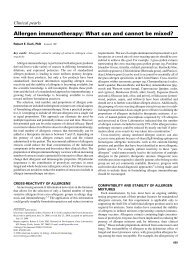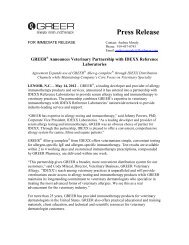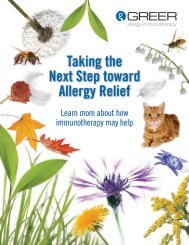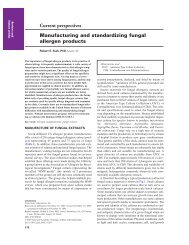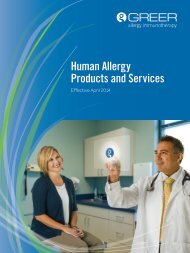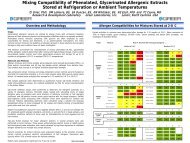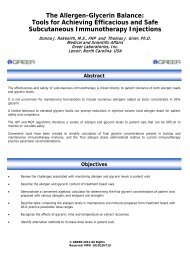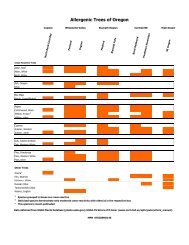allergenic extracts pollens, molds epidermals, insects dusts ... - Greer
allergenic extracts pollens, molds epidermals, insects dusts ... - Greer
allergenic extracts pollens, molds epidermals, insects dusts ... - Greer
Create successful ePaper yourself
Turn your PDF publications into a flip-book with our unique Google optimized e-Paper software.
Allergenic extract injections should not be administered in the presence of diseases<br />
characterized by a bleeding diathesis.<br />
Children with nephrotic syndrome require careful consideration and probably should<br />
not receive injection therapy because a variety of seemingly unrelated events, such as<br />
immunization, can cause an exacerbation of their nephrotic disease.<br />
General contraindications include:<br />
EXTREME SENSITIVITY TO THE SPECIFIC ALLERGEN - Determined from<br />
previous anaphylaxis following exposure.<br />
AUTOIMMUNE DISEASE - Individuals with autoimmune disease may be at risk, due<br />
to the possibility of routine immunizations exacerbating symptoms of the underlying<br />
disease.<br />
WARNINGS<br />
Concentrated <strong>extracts</strong> must be diluted with a sterile diluent prior to first use on a<br />
patient for treatment or intradermal testing. Allergenic Extracts are manufactured to<br />
assure high potency and have the ability during skin testing and immunotherapy to<br />
cause serious local and systemic reactions including death in sensitive patients. Most<br />
reactions occur within 20 minutes after injection, (15) but may occur later. (16) To minimize<br />
the potential for local or systemic reactions, the relative sensitivity of the patient must be<br />
assessed from the allergic history and from clinical observations. Patients should be<br />
informed of these risks prior to skin testing and immunotherapy (see PRECAUTIONS<br />
and ADVERSE REACTIONS below).<br />
Allergenic Extract immunotherapy doses should be lowered or temporarily withheld<br />
from patients if any of the following conditions exist:<br />
(1) severe symptoms of rhinitis and/or asthma<br />
(2) infection or flu accompanied by fever<br />
(3) exposure to excessive amounts of clinically relevant allergen prior to a scheduled<br />
injection<br />
(4) evidence of a local or systemic reaction to the preceding extract injection during<br />
a course of immunotherapy<br />
The dosage must be reduced when modifying dosages or components in a mixture<br />
or an individual prescription, or when starting a patient on fresh extract, even though the<br />
labeled strength of the old and new vials may be the same. This reduction in dosage<br />
may be necessary due to the older vial losing potency during storage, or due to different<br />
sensitivities to different components. The amount of new extract given should not<br />
exceed 25% of the last dose given from the old vial, assuming both <strong>extracts</strong> contain<br />
comparable amounts of allergen. Any evidence of a local or generalized reaction<br />
requires a reduction in dosage during the initial stages of immunotherapy, as well as<br />
during maintenance therapy.<br />
PRECAUTIONS<br />
GENERAL:<br />
Not for intravenous use!<br />
Systemic allergic reactions may occur as a result of immunotherapy. The risk can be<br />
minimized by adherence to a careful injection schedule, which starts with a low<br />
concentration of extract and is increased slowly. Because of the danger of serious



